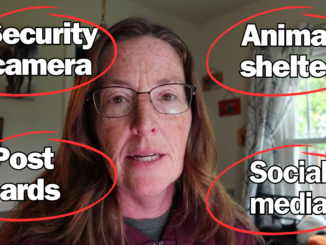
Losing a pet can be a frightening and emotional experience, leaving you vulnerable to making bad decisions. Following ineffective search methods or falling prey to heartless scammers can waste time, energy and money and ultimately delay the reunion with your lost pet. Here are some of the most common myths and scams in lost pet recovery that you should be aware of.
The Dirty Litter Box
The “Dirty Litter Box” myth is one of the most common myths that just will not die. Literally every social media post involving a lost cat will include one or more comments suggesting this method. “Put the dirty litter box outside. Cats can smell it from a mile away and they’ll come right home!” There are so many things wrong with this statement that I don’t even know where to start.

First, most missing cats are not “lost.” Instead, they are stuck somewhere, hiding, ill or injured, at someone’s house or at an animal shelter. An indoor cat who has gotten out for the first time is likely hiding nearby. He knows where he is, he’s just too scared to go to the door or even to respond to the owner’s voice calling. An outdoor cat may have been hit by a car or attacked by a dog, or experienced any number of other traumas. He may have explored in a neighbor’s shed and now the door is locked and he can’t get out. He knows how to get home, he just can’t. A friendly cat may have been picked up by someone who assumes he has been abandoned. This cat is now trapped in that person’s house or at an animal shelter, possibly miles away.
Second, as humans we misunderstand how animals’ olfactory abilities work. Our sense of smell is very poor compared to dogs and cats, so we can only understand being drawn by odors which are very strong, such as cooking smells, excrement, or a spilled bottle of perfume. Animals live in a totally different world where every person and animal, every location and action, has a distinct smell that can be easily tracked. Every step we take, we leave scent molecules in the air. This is how search dogs can find missing people (and pets) even days after their disappearance. If your cat is close to home, he is aware of a plethora of smells including you, your family members, and your other pets. He doesn’t need a stinky litter box to get his attention. Additionally, such a box could potentially attract other cats, especially territorial males, who may spray, deterring your cat from approaching the house.
The greatest danger in using what we call a “passive method” is in the action that is not taken. If you put out the box and hope for the best, you may not utilize other methods like physical searching, talking to neighbors, and checking the shelters, methods known to be effective in finding missing pets.
Pets Go Away to Die
Another very popular myth is that pets “go away to die.” This belief is based on human ideas of life and death, religion, and an afterlife. We don’t know what animals think or believe. All we know is that they live their lives from day to day in the physical world, responding to situations in predictable and practical ways. When a pet disappears then is later found dead, this confirms the belief in the owner’s mind thanks to confirmation bias.
The danger in this belief is, similar to the dirty cat box, the resulting inaction of the owner. In reality, old and ill pets who have suddenly disappeared have done so because they are in trouble and need help. They have had a seizure or some other medical event, they are in kidney failure, they were hit by a car or attacked by another animal. I have seen countless such cases in my years in animal sheltering.

In one case, an elderly cat went missing and was found by a neighbor hiding in the bushes. The cat was so sick he was unable to get up much less return home. Thankfully the neighbor brought the cat to the vet where they scanned for a chip and they were able to contact the owner. She had been looking for her cat, but because he was near comatose he had not responded to her calling and walking by. He required medical care, but recovered and was kept safely inside after that.
In another case, an elderly Australian Shepherd was picked up as a stray and brought to the shelter. He was found lying in a ditch looking confused and unable to get up. When the owner came in to reclaim, he was surprised, saying his dog had lived out on the ranch all these years and never left the property. We tried to explain to him that dogs can become demented in their old age, wander away, and forget how to return home. Thankfully this dog had a microchip, or else the owner might not have even come looking assuming he was out on the large property somewhere.
My pet was killed by a predator
Many people, especially in wooded areas, believe that their pet was killed by a predator. I’ve heard it a million times. “Oh, there are a lot of coyotes around here,” followed by a sad and resigned head shake. While it is possible that a smaller pet could be killed by a predator, it is a very uncommon occurrence.
In some areas, wild animals like coyotes do hunt and kill pets. Los Angeles is one well-known example. In this highly congested area coyotes have lived among people for many generations, making adaptations to their normal hunting behavior. Hunting is taught to young pack animals by the family, so if the mother hunts cats, so will the offspring. In LA, coyotes have even been known to attack children, so they have completely lost their fear of people and see them as just another animal.
While the LA example is extreme, in most other parts of the country, coyotes stick to their natural prey of rabbits, rodents, lizards, and larger wild animals like fawns when hunting in a group. When other options are available, predators will avoid close contact with people and steer clear of prey that can fight back and inflict serious injury, like a cat or dog.
The danger in this myth is, again, the resulting inaction of the owner. If they believe their pet has been killed, they will discontinue searching. In the meantime, their cat could be hiding somewhere, injured and in need of help, or their dog could be waiting for them in a kennel at the local shelter.
Pet psychics
Pet psychics are very popular in the world of missing pets, not often with good results. While there is definitely more to the world than what we can see and hold in our hands, relying on this kind of information can waste time and energy better spent on known pet recovery techniques.
Pet psychics run the gamit like any other service provider. Some are sincere and really want to help. They will perform a reading and give you information that they hope will be helpful. Others may be just looking for money and will tell you whatever you want to hear, or give you generic information that isn’t at all helpful.
In one extreme example, a woman contacted the nonprofit group Mission Reunite looking for her missing cat. The person helping her at the time went through all the usual questions about how the cat had gone missing and what steps had been taken to find him. It soon became clear that she was relying on the advice of a pet psychic who said the cat was out in a field of a certain description. When asked if she had checked the animal shelter, she said no, because the cat was out in a field. Upon further investigation, it was discovered that this woman had a cat-hating neighbor who had previously trapped her cat and taken him to the shelter! So great was her reliance on the psychic that she hadn’t even considered the likely possibility that it had happened again.
This story is a caution to not rely on any red herring, whether from a psychic or anyone else. By all means investigate all leads, but don’t hyper-focus to the point of ignoring other likely possibilities.
Money scams
Now we get into the down and dirty scams. Scammers and con men have been around since the beginning of time, waiting to prey on people vulnerable for any number of reasons. Just do a Google search on “scams” and you’ll see a long list of recent news stories of good people being parted from their money. Sadly, that list includes lost pet owners.
A common scenario involves a person calling or texting the owner of a missing pet to say they have found the pet. When the joyful owner asks how they can get their pet back, the caller then asks for money. The story of why they need the money varies, but one version is called “the truck driver.” In this scam the caller says they are a truck driver and they found your pet while stopped in your area. For whatever reason they needed to continue driving, so now they are hundreds of miles away and need to have your pet shipped home. They will demand money, usually through wire transfer, money order, or some other way that is difficult or impossible to contest later.
Sadly, many desperate owners do send the money, and never hear from the scammer again, because they never had the pet in the first place. I spoke with one distraught owner over the phone a few years ago. He said a heartless caller had claimed to have his Yorkie, and threatened to kill the dog if the money was not sent! I assured him that this person does not have his dog and this is all a lie. The dog had been missing for months so the owner was so desperate he was ready to believe anything.
A simple remedy for these con artists is to ask for a picture. In today’s world everyone has a phone that can take and send a photo. If the person claiming to have your pet cannot do that, they are just making up a story to get money. They have obtained your information from a lost pet sign, flyer, or internet post, and they have never actually seen your pet; in fact, they may not even live in your area, but are just browsing the internet for potential victims.
Pet detectives
Despite lampooning of the work in the movie Ace Ventura Pet Detective, this is a serious business that provides a much-needed service to the suffering owners of missing pets. Pet detectives come in all shapes and sizes, so if you’re going to hire one, you need to do your homework.
One of my goals through my work with Mission Reunite is to properly train people to assist owners in finding their missing pet. We call this training the Missing Pet Consultant Program. The reason this is so important is that misinformation is worse than no information at all. If well-meaning folks are telling owners to use ineffective methods like putting out a dirty cat box, or suggesting they stop searching because there are a lot of coyotes in the area, no one has been helped.

We train people primarily to add their skills to an existing job, like an animal shelter worker or pet sitter, or to work as a volunteer. These skills consist primarily of counseling and educating owners with the possibility of physical assistance. We do not train search dogs, which is a whole other world.

Reputable pet detectives like Lost Pet Tracker (dog pictured) have the proper knowledge and experience to help the owner of a missing pet. They and their search dogs are properly trained to do the work that is required. They maintain the proper licensure and other legal requirements for their state. Further, they will carefully evaluate each case remotely to see if (more expensive) in-person assistance is warranted. They use all the tools at their disposal and they do not make false promises or guarantees. Although this is how they make their living, their goal is to help you, not to make the maximum amount of money.
On the other hand, disreputable pet detectives will take your money and run … literally. In one case I was involved in, the owner of a missing elderly Rottweiler hired such a person to do a search. She started at the place the dog was last seen, a park where he was being walked, then proceeded to go for miles into town and down the Coastal highway on a wild goose chase. She insisted that her search dog was picking up the scent there, but that was highly unlikely as the dog was quite elderly and no one had seen him in town.
Frustrated, the owner later called Mission Reunite and we referred him to a reputable pet detective who performed a (proper) search. Sadly, she uncovered remains near the location where the dog went missing in the park. Based on the condition, the dog had likely wandered away from the pack and walker, had a seizure or some sort of medical event, and died that same day. It wasn’t what his loving owner wanted to hear, but at least it was the truth.
If you’re going to hire a pet detective, first make sure the business is operating legally. In many states, if a pet detective is charging for services, a private investigator license is required, in addition to a business license and any other local requirements. Some would-be pet detectives get around this by saying they are a “volunteer” and asking for “donations.” Be aware that, unless the volunteer is representing a registered nonprofit organization and the money is going directly to the organization, it is not a donation, it is a fee for service. Also be aware that, while some volunteers with proper knowledge and experience can be very helpful, as in the recent case of Finding Minnie in Australia, others may give you inaccurate information and waste your time
As with any business, check references. Good pet detectives are in high demand and will have a long list of folks willing to sing their praises. Check reviews online. Any business will have a negative review or two, but if there are many and the complaints are consistent, it’s best to steer clear. Also check out the business owner’s website, and don’t even say they don’t have a website in the 2020’s! If they make absurd claims like their search dog can pick up scent a year later, or they guarantee to find your pet, again steer clear.
Paid services
Paid services aren’t really scams because you do get what you pay for, but think a minute before pulling out your credit card, as many of these tasks you could do yourself for free or for minimal cost. These services always come up first in internet searches because the companies pay quite a bit for advertising placement. Often by the time pet owners reach us at Mission Reunite or Lost Dogs of America, they have already spent money on these services. This is one of the reasons why we work hard on our SEO, so folks can get immediate access to free and helpful information.
What exactly are these services, and how can they help you in your search? They include robo calls, emails, and faxes to individuals and businesses in your geographic area. Some include paid listings on lost pet sites or boosted posts on Facebook and other social media.
I don’t know about you, but I get robo calls all day long. I preview the messages with a “visual voicemail” feature on my phone and rarely listen to them unless it’s from someone I know or a call I was expecting. Because of my work, I would be interested in a message about a missing pet, but I imagine most folks would not.
I am on the e-blast list for Home Again Pet Rescuers and other missing pet notification lists, but the emails I get are rarely useful. A missing cat in the next town is technically in my region, but I’m unlikely to spot a kitty 20 miles from my home. I have yet to receive a notice of a pet missing in my immediate area that I might actually see or hear about.
Faxes. Who still has a fax machine in the 2020’s? I don’t know, but I can tell you what happens to all the faxes and email attachments that go to shelters and vet hospitals. They are printed, punched with holes, and put in a binder, likely to be never looked at again.
Your time and money are better spent visiting vets and shelters yourself, talking to people directly, printing and handing out flyers. You are much more likely to engage folks in your search in this manner, to get them emotionally involved and caring about you and your lost pet. You can post on any number of free sites on the internet yourself, and boosting posts can cost very little, like $20-$30. Check out Using technology to find a lost pet for more details on how you can use the internet and other tech to bring your pet home.





Be the first to comment